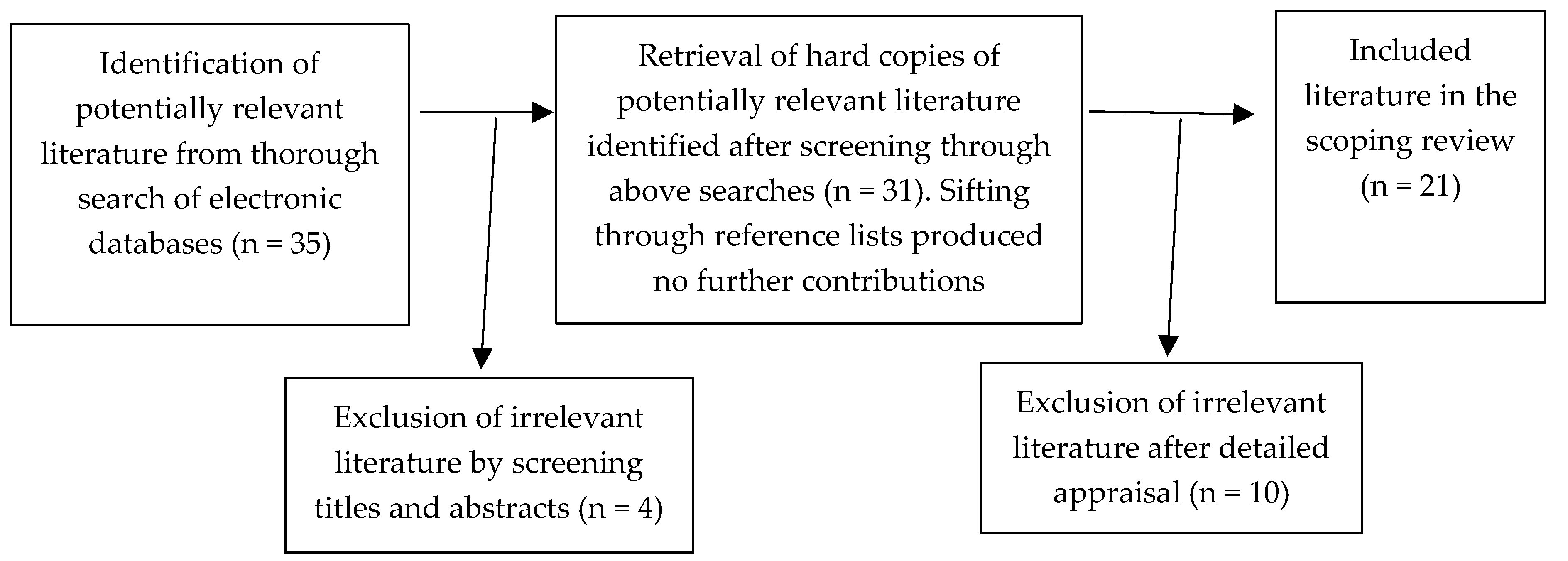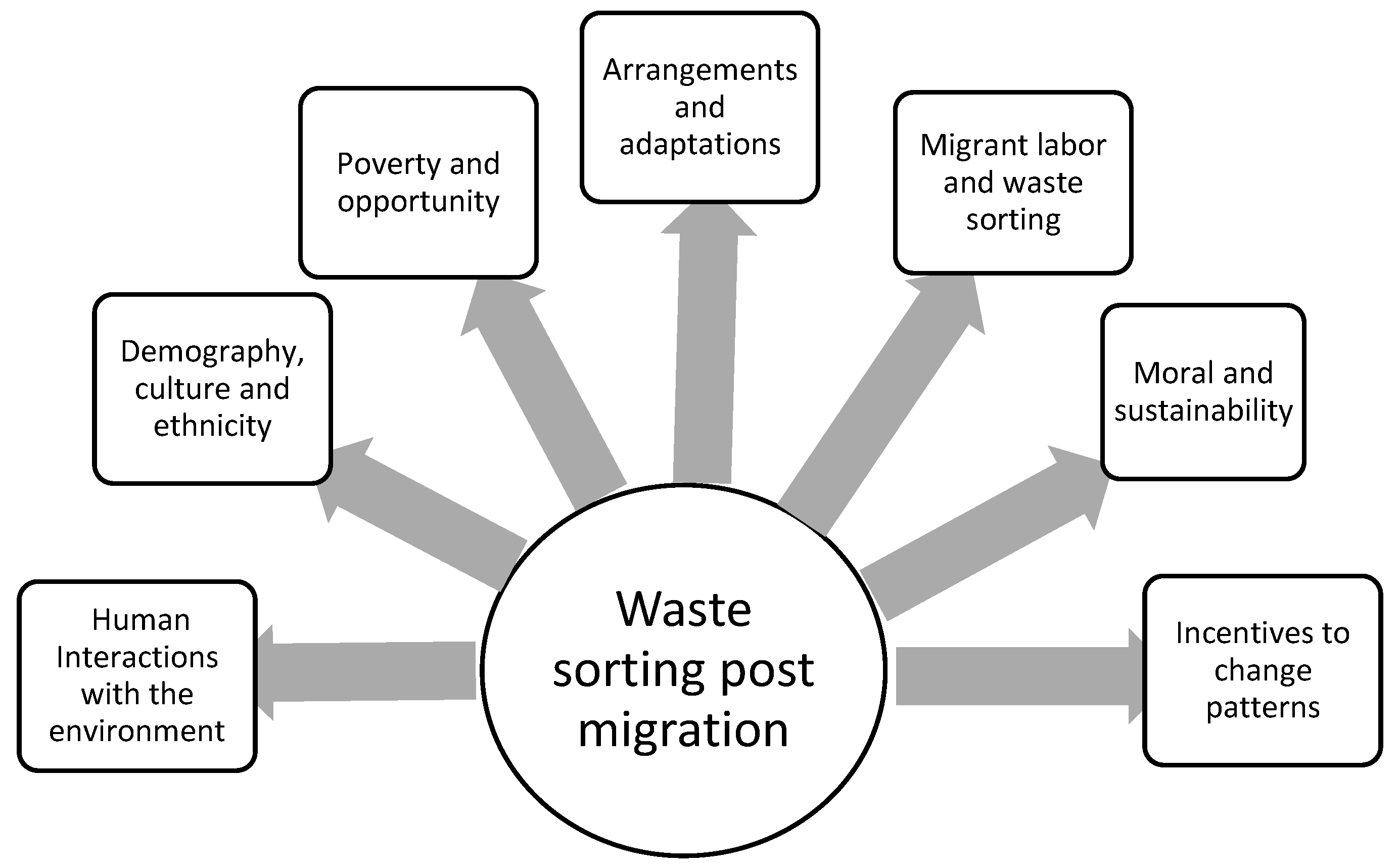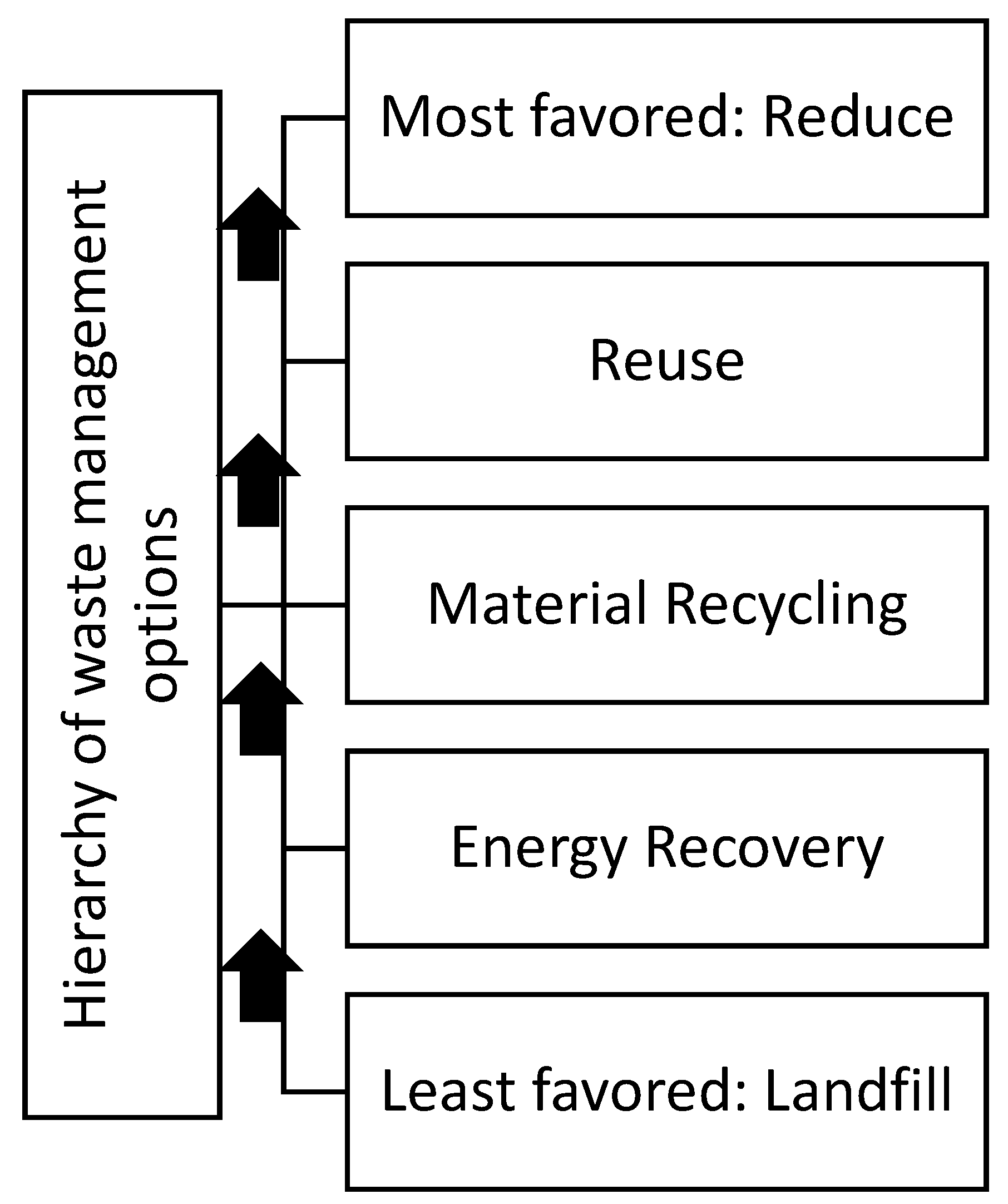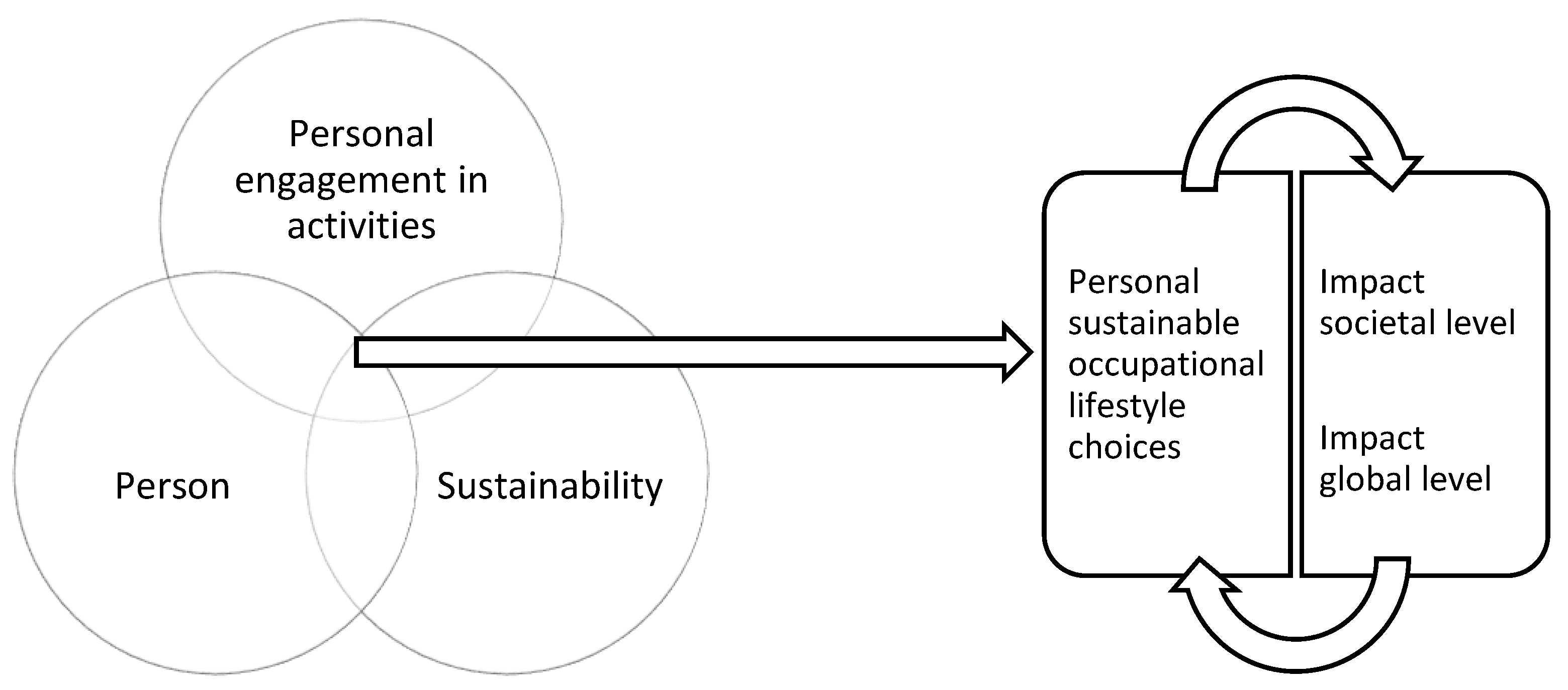Household Waste Sorting and Engagement in Everyday Life Occupations After Migration—A Scoping Review
Abstract
1. Introduction
2. Materials and Methods
2.1. Data Collection
2.2. Selection
2.3. Processing and Analysis
3. Results and Discussion
3.1. Human Interactions with the Environment
3.2. Demography, Culture and Ethnicity
3.3. Poverty and Opportunity
3.4. Arrangements and Adaptations
3.5. Migrant Labor in Recycling and Waste Sorting
3.6. Dynamics between Moral, Ethics and Sustainability
3.7. Incentives to Change Patterns
4. Reflection
5. Conclusions
6. Limitations
Author Contributions
Funding
Conflicts of Interest
Appendix A
| Ref. | Objectives | Focus and Methodology | Relevant Findings |
|---|---|---|---|
| Miafodzyeva, Brandt and Andersson [24] | To investigate possible determinants of recycling behavior among Järva (Sweden) householders (home to a significant proportion of immigrants from different parts of the world/diverse ethnic minorities) | The recycling behavior of householders living in a multicultural urban area Quantitative questionnaire and qualitative interviews |
|
| Gregson, Crang, Botticello, Calestani and Krzywoszynska [25] | To analyze three sectors “inside the EU’s green economy: recycling ‘dry recyclables’, textiles and ships” | Migrant labor and ship recycling, textile recycling and dry recyclables Analysis of three sectors |
|
| Bonatti [26] | To address the intersection of gender, race and immigration in urban recycling schemes in the city of Naples, Italy, a growing destination for labor migrants and an area with a long history of waste management crises | Migrant women’s environmental work Ethnography |
|
| Hage, Sandberg, Söderholm and Berglund [27] | To investigate the regional heterogeneity of household plastic waste collection among Swedish municipalities, and how collection rates have been influenced by local waste management policies, geographical conditions and socio-economic conditions | Regional heterogeneity of household recycling of plastic waste Spatial econometrics |
|
| Dijkgraaf and Gradus [28] | To estimate household reactions to the implementation of unit-based pricing for the collection of residential waste in The Netherlands | Cost savings of unit-based pricing of household waste Cross-sectional analysis |
|
| Hage and Söderholm [29] | To investigate the main determinants of collection rates of household plastic packaging waste in Swedish municipalities | Regional differences in household waste collection for plastic waste Regression analysis based on cross-sectional data |
|
| Martin, Williams and Clark [30] | To ascertain whether householders’ attitudes to recycling were contributory factors to the generally poor recycling performance and to investigate other social, cultural and structural influences | Social, cultural and structural influences on household recycling in the U.K. Qualitative and quantitative surveys |
|
| RRF [31] | To explore households’ attitudes to waste and the environment, how dealing with waste fitted within their household routines, and what they claimed to recycle in London, UK | Household waste behavior Quantitative questionnaire and interviews |
|
| RRF [32] | To measure how much has changed since the original RRF survey in 2001 in London, UK | Household behavior in 2005 Quantitative survey |
|
| Coggins [33] | To list a number of aspects that impact policy options in regards to the shared responsibility of waste prevention in the UK | The shared responsibility of waste prevention for producers and consumers n.a. (communication paper) |
|
| Hocking and Kroksmark [35] | To illustrate the insights contained in the reports of a UNEP survey of four countries: New Zealand and Sweden, the Philippines and Lebanon, and to suggest how these findings can be applied to individual and community-based interventions to promote more sustainable lifestyles | Sustainable occupational responses to climate change through lifestyle choices n.a. (discussion paper) |
|
| Persson and Erlandsson [36] | To discuss the ethics underlying the occupational repertoire of the post-industrial citizen, giving attention to lifestyle phenomena such as increased tempo and quantity of occupations; manipulation of time, organisms and environments; decreases in sleep, rest and play etc. | Reevaluating post-industrial ethics from an occupational perspective n.a. (discussion paper) |
|
| Wagman [37] | To explore and describe what has recently been written about how occupational therapy/ therapists/science can contribute to ecological sustainability and the prevention of more severe climate change | Occupational contributions to ecological sustainability Literature review |
|
| Algado and Townsend [38] | To propose a new narrative for humanity by connecting ecology with broad ideas about occupation and occupational justice | Eco-social occupational therapy n.a. (research paper) |
|
| Aoyama, Hudson and Hoover [39] | To argue that the concept of ‘‘occupation’’ is a crucial addition to understanding connective relations between the ecosystem and human well-being, and to propose that human well-being, human activity, and ecosystem services are mediated by occupational performance | Occupations mediating the ecosystem with human well-being n.a. (opinion piece) |
|
| Capon [40] | To address human occupations as Determinants of health and to link the perspectives on people, places and the planet | Occupation, population health and linking the perspectives of people, places and the planet n.a. (lecture) |
|
| do Rozario [41] | To examine the major paradigms of thinking that have created human and environmental crises | Shifting paradigms of the transpersonal dimensions of ecology and occupation n.a. (research paper) |
|
| Ikiugu [42] | To describe a conceptual framework that includes the enhancement of people’s awareness of their occupational impact on issues such as climate, and to develop measurements for occupational adjustment | Possible contributions of occupational scientists to the solution of prevailing global problems n.a. (book) |
|
| Ikiugu and McCollister [43] | To investigate the effectiveness of the Modified Instrumentalism in Occupational Therapy (MIOT) in facilitating change in occupational choices and performance patterns to help address global issues of concern to humanity | Occupation-based framework changing human occupational behavior to address critical global issues Mixed method multiple case phenomenology |
|
| Ikiugu, Westerfield, Lien, Theisen, Cerny and Nissen [44] | To examine the effectiveness of the Modified Instrumentalism in Occupational Therapy model as a framework for facilitating occupational behavior change to address climate change and related issues | Empowering people to change their occupational behavior to address critical global issues Two- and three-standard deviation band analysis and heuristic phenomenology |
|
| Persson and Erlandsson [45] | To examine the current perspective of sustainability and to explore its relation to occupation, and to introduce an elaborated version of the concept of ‘ecopation’ | Connecting sustainability, glocalization and well-being through the concept of ecopation n.a. (discussion paper) |
|
References
- UN. Transforming Our World: The 2030 Agenda for Sustainable Development; United Nations General Assembly: New York, NY, USA, 2015. [Google Scholar]
- SCB. Utrikes Födda I Sverige. Available online: https://www.scb.se/hitta-statistik/sverige-i-siffror/manniskorna-i-sverige/utrikes-fodda/ (accessed on 12 March 2019).
- EC. Closing the Loop—An EU Plan for the Circular Economy; European Commission: Brussels, Belgium, 2015. [Google Scholar]
- EC. Report from the Commission to the European Parliament, the Council, the European Economic and Social Committee and the Committee of the Regions on the Implementation of the Circular Economy Action Plan; European Commission: Brussels, Belgium, 2019. [Google Scholar]
- EC. Commission Launches Circular Plastics Alliance to Foster the Market of Recycled Plastics in Europe; European Commission: Brussels, Belgium, 2018. [Google Scholar]
- Sverige, A. Swedish Waste Management 2018; Avfall Sverige AB: Malmö, Sweden, 2018. [Google Scholar]
- Rousta, K.; Richards, T.; Taherzadeh, M.J. An Overview of Solid Waste Management toward Zero Landfill: A Swedish Model. In Resource Recovery to Approach Zero Municipal Waste, 1st ed.; Taherzadeh, M.J., Richards, T., Eds.; CRC Press: Boca Raton, FL, USA, 2016. [Google Scholar]
- Taherzadeh, M.J.; Richards, T. Resource Recovery to Approach Zero Municipal Waste; CRC Press: Boca Raton, FL, USA, 2015. [Google Scholar]
- Rousta, K. Household Waste Sorting at the Source: A Procedure for Improvement; University of Borås: Borås, Sweden, 2018. [Google Scholar]
- Petit-Boix, A.; Leipold, S. Circular economy in cities: Reviewing how environmental research aligns with local practices. J. Clean. Prod. 2018, 195, 1270–1281. [Google Scholar] [CrossRef]
- Tucker, P. Understanding recycling behaviour. Paper Technol. 2001, 42, 51–54. [Google Scholar]
- Barr, S. Household Waste in Social Perspective: Values, Attitudes, Situation and Behaviour; Ashgate: Burlington, VT, USA, 2002. [Google Scholar]
- Ölander, F.; Thøgersen, J. Understanding of consumer behaviour as a prerequisite for environmental protection. J. Consum. Policy 1995, 18, 345–385. [Google Scholar] [CrossRef]
- Madden, T.J.; Ellen, P.S.; Ajzen, I. A Comparison of the Theory of Planned Behaviour and the Theory of Reasoned Action. Personal. Soc. Psychol. Bull. 1992, 18, 3–9. [Google Scholar] [CrossRef]
- Weinreich, P. ‘Enculturation’, not ‘acculturation’: Conceptualising and assessing identity processes in migrant communities. Int. J. Intercult. Relat. 2009, 33, 124–139. [Google Scholar] [CrossRef]
- Wilcock, A. A theory of the human need for occupation. J. Occup. Sci. 1993, 1, 17–24. [Google Scholar] [CrossRef]
- Kielhofner, G. A Model of Human Occupation: Theory and Application; Lippincott Williams & Wilkins: Philadelphia, PA, USA, 2002. [Google Scholar]
- Shannon, P. The work-play model: A basis for occupational therapy programming. Am. J. Occup. Ther. 1970, 24, 215–218. [Google Scholar]
- Reilly, M. Play as Exploratory Learning; Sage: Beverly Hills, CA, USA, 1974. [Google Scholar]
- CAOT. Enabling Occupation II: Advancing an Occupational Therapy Vision for Health, Well-Being and Justice through Occupation; CAOT Publications ACE: Ottawa, ON, Canada, 2007. [Google Scholar]
- Yerxa, E.J.; Clark, F.; Frank, G.; Jackson, J.; Parham, D.; Pierce, D.; Stein, C.; Zemke, R. An introduction to occupational science: A fondation for occupational therapy in the 21st century. Occup. Ther. Health Care 1989, 6, 1–17. [Google Scholar] [CrossRef]
- Peterson, J.; Pearce, P.F.; Ferguson, L.A.; Langford, C.A. Understanding scoping reviews: Definition, purpose, and process. J. Am. Assoc. Nurse Pract. 2017, 29, 12–16. [Google Scholar] [CrossRef]
- Arksey, H.; O’Malley, L. Scoping studies: Towards a methodological framework. Int. J. Soc. Res. Methodol. 2005, 8, 19–32. [Google Scholar] [CrossRef]
- Miafodzyeva, S.; Brandt, N.; Andersson, M. Recycling behaviour of householders living in multicultural urban area: A case study of Järva, Stockholm, Sweden. Waste Manag. Res. 2013, 31, 447–457. [Google Scholar] [CrossRef] [PubMed]
- Gregson, N.; Crang, M.; Botticello, J.; Calestani, M.; Krzywoszynska, A. Doing the ‘dirty work’ of the green economy: Resource recovery and migrant labour in the EU. Eur. Urban Reg. Stud. 2016, 23, 541–555. [Google Scholar] [CrossRef]
- Bonatti, V. Taking out the garbage: Migrant women’s unseen environmental work. Eur. J. Womens Stud. 2018, 25, 41–55. [Google Scholar] [CrossRef]
- Hage, O.; Sandberg, K.; Söderholm, P.; Berglund, C. The regional heterogeneity of household recycling: A spatial-econometric analysis of Swedish plastic packing waste. Lett. Spat. Resour. Sci. 2018, 11, 245–267. [Google Scholar] [CrossRef]
- Dijkgraaf, E.; Gradus, R.H. Cost savings in unit-based pricing of household waste: The case of the Netherlands. Resour. Energy Econ. 2004, 26, 353–371. [Google Scholar] [CrossRef]
- Hage, O.; Söderholm, P. An econometric analysis of regional differences in household waste collection: The case of plastic packaging waste in Sweden. Waste Manag. 2008, 28, 1720–1731. [Google Scholar] [CrossRef] [PubMed]
- Martin, M.; Williams, I.D.; Clark, M. Social, cultural and structural influences on household waste recycling: A case study. Resour. Conserv. Recycl. 2006, 48, 357–395. [Google Scholar] [CrossRef]
- RRF. Household Waste Behavior in London; Resource Recovery Forum: Skipton, UK, 2001. [Google Scholar]
- RRF. Household Waste Behaviour in London 2005; Brook Lyndhurst: London, UK, 2006. [Google Scholar]
- Coggins, C. Waste prevention—An issue of shared responsibility for UK producers and consumers: Policy options and measurement. Resour. Conserv. Recycl. 2001, 32, 181–190. [Google Scholar] [CrossRef]
- Christiansen, C.H.; Townsend, E.A. The occupational nature of social groups. In Introduction to Occupation: The Art and Science of Living; Christiansen, C.H., Townsend, E.A., Eds.; Pearson Education: Upper Saddle River, NJ, USA, 2011. [Google Scholar]
- Hocking, C.; Kroksmark, U. Sustainable occupational responses to climate change through lifestyle choices. Scand. J. Occup. Ther. 2013, 20, 111–117. [Google Scholar] [CrossRef]
- Persson, D.; Erlandsson, L.K. Time to Reevaluate the Machine Society: Post-industrial Ethics from an Occupational Perspective. J. Occup. Sci. 2002, 9, 93–99. [Google Scholar] [CrossRef]
- Wagman, P. How to contribute occupationally to ecological sustainability: A literature review. Scand. J. Occup. Ther. 2014, 21, 161–165. [Google Scholar] [CrossRef] [PubMed]
- Algado, S.S.; Townsend, E.A. Eco-social occupational therapy. Br. J. Occup. Ther. 2015, 78, 182–186. [Google Scholar] [CrossRef]
- Aoyama, M.; Hudson, M.J.; Hoover, K.C. Occupation Mediates Ecosystem Services with Human Well-Being. J. Occup. Sci. 2012, 19, 213–225. [Google Scholar] [CrossRef]
- Capon, A.G. Human Occupations as Determinants of Population Health: Linking Perspectives on People, Places and Planet. J. Occup. Sci. 2014, 21, 8–11. [Google Scholar] [CrossRef]
- do Rozario, L. Shifting paradigms: The transpersonal dimensions of ecology and occupation. J. Occup. Sci. 1997, 4, 112–118. [Google Scholar] [CrossRef]
- Ikiugu, M.N. Occupational Science in the Service of Gaia: An Essay Describing a Possible Contribution of Occupational Scientists to the Solution of Prevailing Global Problems; Publish America: Baltimore, MD, USA, 2008. [Google Scholar]
- Ikiugu, M.N.; McCollister, L. An occupation-based framework for changing human occupational behavior to address critical global issues. Int. J. Prof. Pract. 2011, 2, 402–417. [Google Scholar]
- Ikiugu, M.N.; Westerfield, M.A.; Lien, J.M.; Theisen, E.R.; Cerny, S.L.; Nissen, R.M. Empowering people to change occupational behaviours to address critical global issues:Habiliter les gens à changer leurs comportements occupationnels en vue d’aborder les grands enjeux mondiaux. Can. J. Occup. Ther. 2015, 82, 194–204. [Google Scholar] [CrossRef] [PubMed]
- Persson, D.; Erlandsson, L.-K. Ecopation: Connecting Sustainability, Glocalisation and Well-being. J. Occup. Sci. 2014, 21, 12–24. [Google Scholar] [CrossRef]
- Dennis, C.W.; Dorsey, J.A.; Gitlow, L. A call for sustainable practice in occupational therapy: Un appel à la pratique durable en ergothérapie. Can. J. Occup. Ther. 2015, 82, 160–168. [Google Scholar] [CrossRef]
- Whittaker, B. Sustainable Global Wellbeing: A Proposed Expansion of the Occupational Therapy Paradigm. Br. J. Occup. Ther. 2012, 75, 436–439. [Google Scholar] [CrossRef]
- Rousta, K.; Ekström, K. Assessing incorrect household waste sorting in a medium-sized Swedish city. Sustainability 2013, 5, 4349–4361. [Google Scholar] [CrossRef]
- Hillman, K.A.; Damgaard, O.; Eriksson, D.; Jonsson, l.; Fluck, L. Climate Benefits of Material Recycling, Inventory of Average Greenhouse Gas Emissions for Denmark, Norway and Sweden; Nordic Council of Ministers: Copenhagen, Denmark, 2015. [Google Scholar]
- Baumann, H.; Tillman, A.-M. The Hitch Hiker’s Guide to LCA; Studentlitteratur AB: Lund, Sweden, 2004. [Google Scholar]
- Bolton, K.; de Mena, B.; Schories, G. Sustainable Management of Solid Waste. In Resource Recovery to Approach Zero Municipal Waste; Taherzadeh, M.J., Richards, T., Eds.; CRC Press: Boca Raton, FL, USA, 2016; pp. 23–40. [Google Scholar]
- Von Wright, G. Humanismen Som Livshållning [Humanism as a Life Stance]; AB Rabén & Sjögren Bokförlag: Stockholm, Sweden, 1978. [Google Scholar]
- IOM. World Migration Report 2018. Available online: https://www.iom.int/wmr/world-migration-report-2018 (accessed on 29 April 2019).
- Miafodzyeva, S.; Brandt, N. Recycling behaviour among householders: Synthesizing determinants via a meta-analysis. Waste Biomass Valor. 2013, 4, 221–235. [Google Scholar] [CrossRef]
- Ando, A.W.; Gosselin, A.Y. Recycling in multifamily dwellings: Does convinience matter? Econ. Inq. 2005, 43, 426–438. [Google Scholar] [CrossRef]
- Beigl, P.; Lebersorger, S.; Salhofer, S. Modelling municipal solid waste generation: A review. Waste Manag. 2008, 28, 200–214. [Google Scholar] [CrossRef] [PubMed]
- Rousta, K.; Bolton, K. Sorting Household Waste at the Source. In Sustainable Resource Recovery and Zero Waste Approaches; Taherzadeh, M.J., Bolton, K., Wong, J., Pandey, A., Eds.; Elsevier: St. Louis, MO, USA, 2019; pp. 105–114. [Google Scholar]
- Becker, N. Increasing High Recycling Rates: Socio-Demographics as an Additional Layer of Information to Improve Waste Management; IIIEE: Lund, Sweden, 2014. [Google Scholar]
- Berglund, C. The assessment of households’ recycling cost: The role of personal motives. Ecol. Econ. 2006, 56, 560–569. [Google Scholar] [CrossRef]
- do Valle, P.O.; Reis, E.; Menezes, J.; Rebelo, E. Behavioral Determinants of Household Recycling Participation:The Portuguese Case. Environ. Behav. 2004, 36, 505–540. [Google Scholar] [CrossRef]
- Hage, O.; Söderholm, P.; Berglund, C. Norms and economic motivation in household recycling: Empirical evidence from Sweden. Resour. Conserv. Recycl. 2009, 53, 155–165. [Google Scholar] [CrossRef]
- Hornik, J.; Cherian, J.; Madansky, M.; Narayana, C. Determinants of recycling behavior: A synthesis of research results. J. Socio Econ. 1995, 24, 105–127. [Google Scholar] [CrossRef]
- Schultz, P.W.; Oskamp, S.; Mainieri, T. Who recycles and when? A review of personal and situational factors. J. Environ. Psychol. 1995, 15, 105–121. [Google Scholar] [CrossRef]
- Mosler, H.-J.; Tamas, A.; Tobias, R.; Rodríguez, T.C.; Miranda, O.G. Deriving interventions on the basis of factors influencing behavioral intentions for waste recycling, composting, and reuse in Cuba. Environ. Behav. 2008, 40, 522–544. [Google Scholar] [CrossRef]
- Simó Algado, S. The return of the corn man: An intervention project with a Mayan community of Guatemalan retornos. In Occupational Therapy without Borders: Learning from the Spirit of Survivors; Kronenberg, F., Simó Algado, S., Pollard, N., Eds.; Elsevier: Oxford, UK, 2014; pp. 336–350. [Google Scholar]
- Townsend, E.A.; Wilcock, A.A. Occupational Justice. In Introduction to Occupation: The Art and Science of Living; Christiansen, C., Townsend, E., Eds.; Prentice-Hall: Upper Saddle River, NJ, USA, 2004; pp. 243–273. [Google Scholar]
- Steindl, C.; Winding, K.; Runge, U. Occupation and participation in everyday life: Women’s experiences of an Austrian refugee camp. J. Occup. Sci. 2008, 15, 36–42. [Google Scholar] [CrossRef]
- Whiteford, G.E. Understanding the Occupational Deprivation of Refugees: A Case Study from Kosovo. Can. J. Occup. Ther. 2005, 72, 78–88. [Google Scholar] [CrossRef] [PubMed]
- Strydom, W. Barriers to household waste recycling: Empirical evidence from South Africa. Recycling 2018, 3, 41. [Google Scholar] [CrossRef]
- Omran, A.; Schiopu, A.-M. Reasons for non-participation in recycling of solid waste in northern Malaysia: A case study. Environ. Eng. Manag. J. EEMJ 2015, 14, 233–243. [Google Scholar] [CrossRef]
- Afroz, R.; Hanaki, K.; Tuddin, R. The role of socio-economic factors on household waste generation: A study in a waste management program in Dhaka City, Bangladesh. Res. J. Appl. Sci. 2010, 5, 183–190. [Google Scholar] [CrossRef]
- McDonald, S.; Oates, C. Reasons for non-participation in a kerbside recycling scheme. Resour. Conserv. Recycl. 2003, 39, 369–385. [Google Scholar] [CrossRef]
- Jesson, J. Household waste recycling behavior: A market segmentation model. Soc. Mark. Q. 2009, 15, 25–38. [Google Scholar] [CrossRef]
- Miafodzyeva, S.; Brandt, N.; Olsson, M. Motivation recycling: Pre-recycling case study in Minsk, Belarus. Waste Manag. Res. 2010, 28, 340–346. [Google Scholar] [CrossRef]
- Rousta, K.; Bolton, K.; Lundin, M.; Dahlen, L. Quantitative assessment of distance to collection point and improved sorting information on source separation of household waste. Waste Manag. 2015, 40, 22–30. [Google Scholar] [CrossRef]
- Gonzalez-Torre, P.L.; Adenso-Diaz, B. Influence of distance on the motivation and frequency of household recycling. Waste Manag. 2005, 25, 15–23. [Google Scholar] [CrossRef]
- De Young, R. Recycling as appropriate behavior: A review of survey data from selected recycling education programs in Michigan. Resour. Conserv. Recycl. 1990, 3, 253–266. [Google Scholar] [CrossRef]
- Vicente, P.; Reis, E. Factors influencing households’ participation in recycling. Waste Manag. Res. 2008, 26, 140–146. [Google Scholar] [CrossRef] [PubMed]
- Dauvergne, P.; LeBaron, G. The Social Cost of Environmental Solutions. New Polit. Econ. 2013, 18, 410–430. [Google Scholar] [CrossRef]
- Csikszentmihalyi, M. The Evolving Self: A Psychology for the Third Millennium; Harper Perennial: New York, NY, USA, 1993. [Google Scholar]
- Kuhn, T.S. The Structure of Scientific Revolutions; University of Chicago Press: Chicago, IL, USA, 2012. [Google Scholar]
- Sismondo, S. An Introduction to Science and Technology Studies, 2nd ed.; Wiley-Blackwell: Oxford, UK, 2009. [Google Scholar]
- Directive, E.P.a.C. Packaging and Packaging Waste. Off. J. Eur. Communities 1994, L365. [Google Scholar]
- Hage, O. The Swedish producer responsibility for paper packaging: An effective waste management policy? Resour. Conserv. Recycl. 2007, 51, 314–344. [Google Scholar] [CrossRef]
- Wilcock, A. An Occupational Perspective on Health; Slack: Thorofare, NJ, USA, 1998. [Google Scholar]
- Shen, L.; Si, H.; Yu, L.; Si, H. Factors Influencing Young People’s Intention toward Municipal Solid Waste Sorting. Int. J. Environ. Res. Public Health 2019, 16, 1708. [Google Scholar] [CrossRef] [PubMed]
- Culiberg, B.; Bajde, D. Consumer recycling: An ethical decision-making process. J. Consum. Behav. 2013, 12, 449–459. [Google Scholar] [CrossRef]
- Farrell, J. Environmental activism and moral schemas: Cultural components of differential participation. Environ. Behav. 2013, 45, 399–423. [Google Scholar] [CrossRef]
- Caruana, R. A sociological perspective of consumption morality. J. Consum. Behav. Int. Res. Rev. 2007, 6, 287–304. [Google Scholar] [CrossRef]
- Gamba, R.J.; Oskamp, S. Factors influencing community residents’ participation in commingled curbside recycling programs. Environ. Behav. 1994, 26, 587–612. [Google Scholar] [CrossRef]
- Simmons, D.; Widmar, R. Motivations and barriers to recycling: Toward a strategy for public education. J. Environ. Educ. 1990, 22, 13–18. [Google Scholar] [CrossRef]
- Chung, S.-S.; Poon, C.-S. A comparison of waste-reduction practices and new environmental paradigm of rural and urban Chinese citizens. J. Environ. Manag. 2001, 62, 3–19. [Google Scholar] [CrossRef] [PubMed]
- Shaw, P.; Maynard, S. The potential of financial incentives to enhance householders’ kerbside recycling behaviour. Waste Manag. 2008, 28, 1732–1741. [Google Scholar] [CrossRef] [PubMed]
- Wilcock, A. Ocuppation-focused Eco-sustainable Community Development Approach. In An Occupational Perspective of Health; Wilcock, A., Ed.; Slack: Thorofare, NJ, USA, 2006; pp. 220–243. [Google Scholar]
- UNEP. Global Survey on Sustainable Lifestyles. Available online: http://www.unep.fr/scp/marrakech/taskforces/global-survey-on-sustainable-lifestyles.htm (accessed on 1 February 2019).
- UNEP. Vision for Change: Recommendations for Effective Policies on Sustainable Lifestyles. Available online: http://www.unep.fr/scp/publications/details.asp?id=DTI/1321/PA (accessed on 3 February 2019).
- Rajendran, K.; Lin, R.; Wall, D.M.; Murphy, J.D. Influential Aspects in Waste Management Practices. In Sustainable Resource Recovery and Zero Waste Approaches; Taherzadeh, M.J., Bolton, K., Wong, J., Pandey, A., Eds.; Elsevier: St. Louis, MO, USA, 2019; pp. 65–78. [Google Scholar]
- Hudson, M.J.; Aoyama, M. Occupational Therapy and the Current Ecological Crisis. Br. J. Occup. Ther. 2008, 71, 545–548. [Google Scholar] [CrossRef]
- Gifford, R. The dragons of inaction: Psychological barriers that limit climate change mitigation and adaptation. Am. Psychol. 2011, 66, 290. [Google Scholar] [CrossRef] [PubMed]
- Švažas, M.; Navickas, V.; Krajnakova, E.; Nakonieczny, J. Sustainable supply chain of the biomass cluster as a factor for preservation and enhancement of forests. J. Int. Stud. 2019, 2, 309–321. [Google Scholar]
- Łuczka-Bakuła, W. Environmentally-Friendly Activities of Dairy Companies. Econ. Sociol. 2009, 2, 101–107. [Google Scholar] [CrossRef] [PubMed]
- Skopenko, N.; Sagaydack, J. Specific features of development of ecological entrepreneurship in Ukraine. Econ. Sociol. 2013, 6, 28. [Google Scholar] [CrossRef]
- Popovic, T.; Kraslawski, A.; Barbosa-Póvoa, A.; Carvalho, A. Quantitative indicators for social sustainability assessment of society and product responsibility aspects in supply chains. Ind. Ecol. Submitt. 2017, 4, 9–36. [Google Scholar] [CrossRef] [PubMed]
- Chen, F.; Chen, H.; Yang, J.; Long, R.; Li, W. Impact of regulatory focus on express packaging waste recycling behavior: Moderating role of psychological empowerment perception. Environ. Sci. Pollut. Res. 2019, 26, 8862–8874. [Google Scholar] [CrossRef]
- Clark, F.A.; Parham, D.; Carlson, M.E.; Frank, G.; Jackson, J.; Pierce, D.; Wolfe, R.J.; Zemke, R. Occupational science: Academic innovation in the service of occupational therapy’s future. Am. J. Occup. Ther. 1991, 45, 300–310. [Google Scholar] [CrossRef] [PubMed]
- Rousta, K.; Ordoñez, I.; Bolton, K.; Dahlén, L. Support for designing waste sorting systems: A mini review. Waste Manag. Res. 2017, 35, 1099–1111. [Google Scholar] [CrossRef] [PubMed]
- Lancet. Health and climate change: Policy responses to protect public health. Lancet 2015, 386, 1861–1914. [Google Scholar] [CrossRef]
- Noblit, G.W.; Hare, R.D. Meta-Ethnography: Synthesizing Qualitative Studies; Sage: Newbury Park, CA, USA, 1988. [Google Scholar]




© 2019 by the authors. Licensee MDPI, Basel, Switzerland. This article is an open access article distributed under the terms and conditions of the Creative Commons Attribution (CC BY) license (http://creativecommons.org/licenses/by/4.0/).
Share and Cite
Hellwig, C.; Häggblom-Kronlöf, G.; Bolton, K.; Rousta, K. Household Waste Sorting and Engagement in Everyday Life Occupations After Migration—A Scoping Review. Sustainability 2019, 11, 4701. https://doi.org/10.3390/su11174701
Hellwig C, Häggblom-Kronlöf G, Bolton K, Rousta K. Household Waste Sorting and Engagement in Everyday Life Occupations After Migration—A Scoping Review. Sustainability. 2019; 11(17):4701. https://doi.org/10.3390/su11174701
Chicago/Turabian StyleHellwig, Coralie, Greta Häggblom-Kronlöf, Kim Bolton, and Kamran Rousta. 2019. "Household Waste Sorting and Engagement in Everyday Life Occupations After Migration—A Scoping Review" Sustainability 11, no. 17: 4701. https://doi.org/10.3390/su11174701
APA StyleHellwig, C., Häggblom-Kronlöf, G., Bolton, K., & Rousta, K. (2019). Household Waste Sorting and Engagement in Everyday Life Occupations After Migration—A Scoping Review. Sustainability, 11(17), 4701. https://doi.org/10.3390/su11174701






